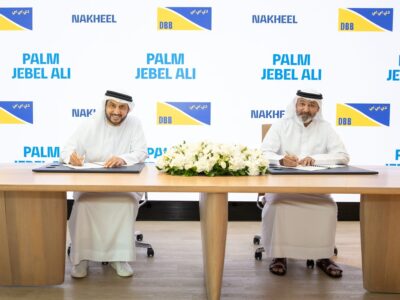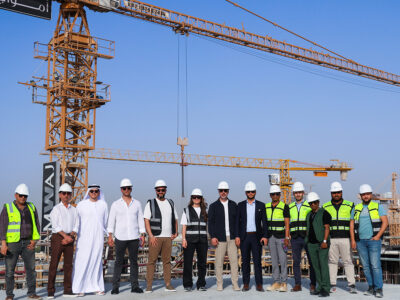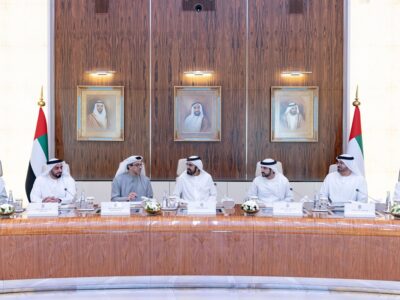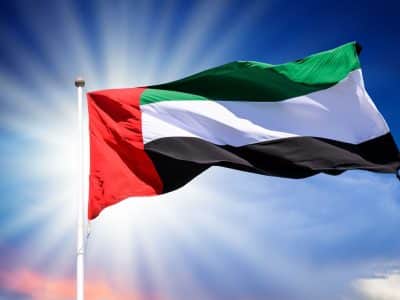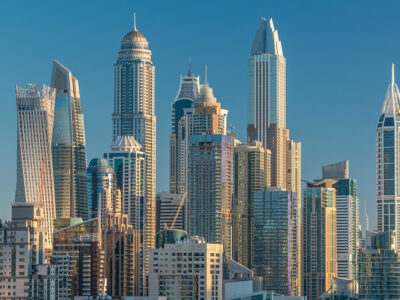Dr Ravi Pillai likes a good view. We are at the 106th floor of the Burj Khalifa, inside his fabulous four-bedroom apartment, surveying the Dubai skyline.
“That’s it there,” he says, pointing excitedly to a plot of land a few hundred yards behind the Dubai Mall. “That’s my next big thing.”
It’s quite a statement from the Indian tycoon. For in the past 35 years, Pillai has done some pretty big things: His RP Group has become a global business conglomerate with operations in the Middle East, Asia, Australia and Africa, bringing in $4bn a year in revenues and employing a staggering 80,000 staff. Having made its name in construction and industrial development, notably building oil refineries and gas plants in the GCC, it has successfully branched out into healthcare, hospitality, education, IT and trading. If that wasn’t enough, Pillai is now storming into the real estate market as a developer, with $1.5bn of projects in Dubai already on the cards. Little wonder he is now worth a cool $2.8bn and, according to Forbes, the second richest Indian in the GCC.
Not bad for the boy from Kerala who at the age of 14 started running his first business just so he could pay for school books and see the odd movie.
“To me it’s just been one step at a time; it’s never been about the money, just trying to work hard and do things the right way,” he says.
Judging by the numbers, he has been doing plenty of both, with revenues having gone up by 20 percent a year over the last decade, and forecast to do the same for the next ten years. Around 80 percent of the group’s work is now in industrial development, particularly the oil and gas sector, with much of the rest going on the construction of high-rise buildings and five-star hotels. RP Group has become the go-to contractor for engineering, procurement and construction (EPC) companies building refineries, petrochemical and gas plants in Saudi Arabia and Qatar, with the likes of ExxonMobil, BP, Shell, Aramco and RASGAS regularly counting on Pillai to be their construction specialist.
“We have recently started working outside the Middle East, because investors from other regions are inviting us to work with them. These jobs need to be completed within two or three years, as per the agreement with the banks. So these investors would prefer to work with trusted partners,” he says, adding: “Companies look for the best contractors with good technology, the best engineers as well as manpower. It is very difficult to get specialists and RP Group has such manpower.”
Manpower is the key here, and Pillai has plenty of it, with the size of his workforce expected to rise to 100,000 by March next year. Nearly half the staff at the company have been there for the best part of three decades. While the construction sector is notorious for low pay and poor working conditions, Pillai suggests RP Group is uniquely different, with a pool of largely satisfied workers.
He explains: “A company’s asset is manpower. When you have money, you can buy new equipment or new vehicles, but you cannot buy manpower. We need employees to trust us and feel like a family. When you get a cake and try to eat the whole cake, you will upset your stomach. When you share your cake with everyone around you, all are happy. That is my policy. When we get profits, we give bonuses to our workers every month. Once we hit our targets, we give them their bonus with their salaries. So people are happy.”
Pillai adds: “We have 10,000 — 15,000 people staying in each workers’ camp. We have a canteen that’s open 24 hours, with the best quality food. We have special vehicles transporting food to the construction sites. We buy the best quality rice, chicken and vegetables. So people know that we are cooking good food. We know that without the support of the workers, we can’t do anything.”
And next up this camp of happy workers is heading to Dubai, as Pillai embarks on his next mega venture — entering the Dubai property market as a developer. A new company, branded RP Global, has been formed to lead this charge, with $1.5bn being invested to launch two projects, in Dubai’s Business Bay and Sheikh Zayed Road.
Article continued on next page…
The first of these will be a 50-storey residential tower in Business Bay, to be officially unveiled at the end of this year, followed by a mixed-use centre, which includes a five-star hotel, serviced apartments and retail outlets. Given there are already more than 900 developers working in Dubai, isn’t a move into property a risky one, especially for a man used to nothing but success? “Not really. We have our own land and we will deploy our own funds.
“For RP Group, real estate is not a new sector. One of our subsidiaries — Gulf Asia Contracting — has built several multi-storey residential and commercial buildings. We built the French Embassy in Riyadh and did the entire MEP work for the Kingdom Tower in Riyadh.
“This will be a huge differentiator for RP Global. We will have the expertise and track record of Gulf Asia to ensure we deliver high quality real estate projects in Dubai.
“Dubai is booming, with a population of about 2 million, and within ten years it will have 3 million people. People from Saudi Arabia, Qatar and Kuwait want to own a house in Dubai,” he says.
But Pillai insists RP Global will invest its own money on these projects. “Though bankers are ready to lend money, we are going to use our own money. Property business may slip, but never die. From my experience, I think the property sector will continue to remain in positive territory because the Government of Dubai has a good control over the sector. I think there will be a 5-10 percent growth in the property sector in the next one year. Compared to real estate in Singapore or Mumbai, Dubai is the best place to invest.”
As for all the talk of a second property crash, Pillai is having none of it. “I’m not worried, because during the last 35 years, wherever I invested, I have not lost money. These projects will be differentiated by optimal floor area ratios, high ceilings and large balconies that add to quality of life. We are committed to delivering the highest service standards to customers across all touch points. I don’t worry about demand. We have not yet even decided on the prices, and I know some people will want to buy several apartments. But I am very confident we will deliver something really special, which is why we intend to sell one unit to each buyer.”
The move into real estate development is just one of a number of expansion fronts that Pillai is eyeing. Around $300m is being invested into Dubai’s hospitality sector, through two new hotels: The Raviz in Bur Dubai and the Crowne Plaza operated hotel in Dubai Marina.
The group’s oil and gas footprint in the UAE is being enlarged, where it already has $350m worth of projects, and it is looking at geographic expansion into Africa and the US.
The Australian government has invited RP Group to establish operations in the LNG and mining sectors, with an office already opened up in Perth and operations being expanded into Queensland, Brisbane and Melbourne. Pillai says this is a “long-term investment”, adding “there is a big shortage of skilled professionals in Australia and we are creating a talent pool of local professionals in the country.
“We now run the OMG Technical Institute in Australia that trains skilled manpower for large scale projects in the country.”
And watch out for Pillai really making his mark in the education sector, where he is looking for strategic joint ventures. He says: “We construct schools in Bahrain, UAE and Saudi Arabia. We have the New Millennium School in Bahrain providing K-12 education and will be opening a second school there. I’m also looking at another school in the UAE and we are also talking with the Government of India to enter the education sector there. The main reason is because education is expensive. I’m building schools as a service to society and not as a business. So it will be cheaper.”
Article continued on next page…
The group also owns and runs the 350-bed, multi-speciality Upasana Hospital in Kerala, India, besides the Upasana School and College of Nursing.
All of this is a long way from Pillai’s roots. The son of a farmer from Kerala, he started his first business at the age of just 14 — by trading on coconuts. “Farming was not very lucrative. Right from an early age, I was eager to be in business knowing full well that farming was not my vocation. It wasn’t anything big — and whatever little profit I could earn went towards my educational needs to buy books and stationery and see the odd film in the theatre. That was also my first taste of success in business,” he recalls.
By the time he got to college, he borrowed the equivalent of $1,500 to launch a money lending company, and used the profits to fund his higher education, through an MBA evening class.
“While I was doing my MBA, I was advised by some engineers who were my classmates to start a construction business. So I became a contractor for FACT (Fertilisers & Chemicals Travancore Ltd), Cochin Refineries and Hindustan Newsprint Ltd in Vellore. I made very good money,” he says.
That all changed in 1978 when he undertook a contract at the Newsprint factory, which led to stiff opposition from locals convinced he had come to “snatch” their work. Following a strike, he decided, at the age of just 24, to head to Al Khobar in Saudi Arabia on a business visa.
He says: “I did not know anyone there but many Saudi nationals approached me to work with them. Finally, when I founded the company with a Saudi partner, I shouldered the entire investment of SR1m. I ventured into construction and trading; I sold goods to the US Navy and I invested back all profits into the construction business. Nasser Al Hajri, the first company I set up, had 150 people and my first break came from a French company who gave us the contract to build underground hangars for airplanes in Dhahran. The next project came from Bechtel to build the Royal Airport Terminal in Riyadh. In less than five years, we started undertaking refinery projects, which were normally undertaken by Korean companies.”
Pillai adds: “In the 1990s after the Iran-Iraq war, there was a boom. The oil price was around $8-9 per barrel. When the price started increasing, the government invested in infrastructure projects and that’s the reason there was a boom. At that time, $1 was equal to 360 Yen. So we bought everything from Japan. The company really started growing from 1995 onwards.”
It’s fair to say that since then Pillai has never really looked back, and never stopped. In the past three decades, he has not taken more than a week’s holiday, and for the last 15 years has donated 20 percent of his earnings to the poor through his RP Foundation. It mainly provides housing facilities, medical treatments and wedding expenses for the poor.
As for the future, his 26-year-old son is being lined up for a role in the company, with a view to one day taking over the family empire. His 23-year-old daughter, a qualified doctor, will also be joining the business. He anticipates RP Group’s revenues touching the $10bn mark by 2020, and is closely studying the US market, having already opened an office in Houston.
Bizarrely, Pillai has never done an extended interview throughout his career. Warm, engaging and charming, after an hour in his company you are left wondering why. But then again, the more you talk to him, you realise that shouting from the roof top has never been, and never will be, his style. Success is all that matters, and he has plenty of that.
He says: “For me credibility is very important. I don’t want to tell everyone that I am big. It will only bring jealousy. It took me 35 years for the company to come to this stage. If I failed even in one job, I would have lost my name. Getting a good name is very difficult, but losing your reputation is very easy. I can get jobs worth $10bn within three months, using just my name. But I will take the job only based on my capacity. I would rather lose money than reputation. Right now, for me it’s all about RP Global. I want to create a new standard for the real estate sector here in Dubai. That is my ambition.”
Only a fool would bet against him not realising his ambition very, very quickly.
